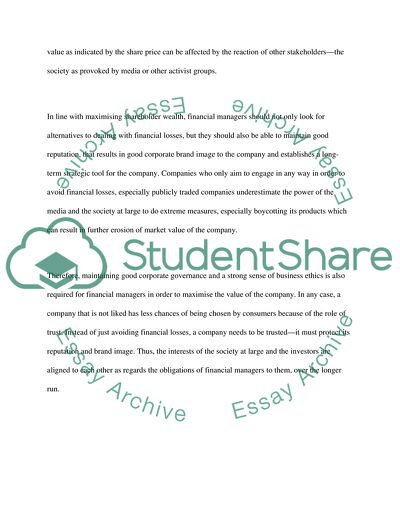
- Home
- Free Samples
- Premium Essays
- Editing Services
- Extra Tools
- Essay Writing Help
- About Us
- Studentshare
- Subjects
- Miscellaneous
- Managerial Accounting
Managerial Accounting - Essay Example

- Subject: Miscellaneous
- Type: Essay
- Level: Undergraduate
- Pages: 4 (1000 words)
- Downloads: 0
- Author: lucie36
Extract of sample "Managerial Accounting"
Therein lies the conflict of interests between the interests of the shareholders, and the interest of other stakeholders such as the society, and the public in general. However, this rule has not been so hard and fast over the decades, when companies, especially the ones who are publicly traded have been perceived as companies who engage in unethical acts. Because the investors-at-large are part of the public, even when companies solve their financial losses through unethical acts, the companys market value as indicated by the share price can be affected by the reaction of other stakeholders—the society as provoked by media or other activist groups.
In line with maximising shareholder wealth, financial managers should not only look for alternatives to dealing with financial losses, but they should also be able to maintain good reputation, that results in good corporate brand image to the company and establishes a long-term strategic tool for the company. Companies who only aim to engage in any way in order to avoid financial losses, especially publicly traded companies underestimate the power of the media and the society at large to do extreme measures, especially boycotting its products which can result in further erosion of market value of the company.
Therefore, maintaining good corporate governance and a strong sense of business ethics is also required for financial managers in order to maximise the value of the company. In any case, a company that is not liked has less chances of being chosen by consumers because of the role of trust. Instead of just avoiding financial losses, a company needs to be trusted—it must protect its reputation and brand image. Thus, the interests of the society at large and the investors are aligned to each other as regards the obligations of financial managers to them, over the longer run.
In order to assess whether a companys move is ethical or not, the company
...Download file to see next pages Read MoreCHECK THESE SAMPLES OF Managerial Accounting
Managerial Accounting Practices
Principles of Managerial Accounting
Introduction to managerial accounting
Importance of Managerial Accounting
Financial Versus Managerial Accounting
Managerial Accounting and Cost Concepts - Delegat's Group Limited
Managerial Accounting at GEK Technologies, Fishermens Co-Op, Parko Department Store
Sustainability in Managerial Accounting

- TERMS & CONDITIONS
- PRIVACY POLICY
- COOKIES POLICY